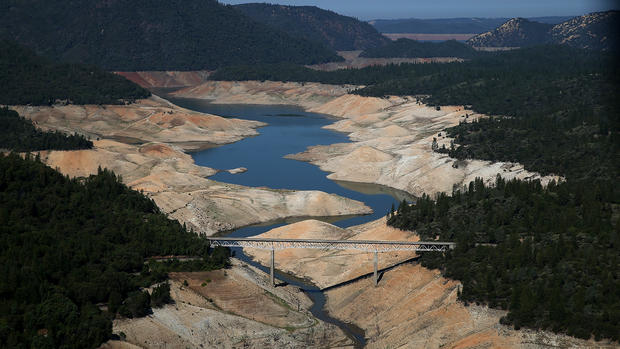California orders steep water cuts for farmers amid drought
SACRAMENTO, Calif. -- Drought-stricken California on Friday ordered the largest cuts on record to farmers holding some of the state's strongest water rights.
State water officials told more than a hundred senior rights holders in California's Sacramento, San Joaquin and delta watersheds to stop pumping from those waterways.
The move by the State Water Resources Control Board marked the first time that the state has forced large numbers of holders of senior-water rights to curtail use. Those rights holders include water districts that serve thousands of farmers and others.
The move shows California is sparing fewer and fewer users in the push to cut back on water use during the state's four-year drought.
"We are now at the point where demand in our system is outstripping supply for even the most senior water rights holders," Caren Trgovcich, chief deputy director of the water board.
The order applies to farmers and others whose rights to water were staked more than a century ago. Many farmers holding those senior-water rights contend the state has no authority to order cuts.
The reductions are enforced largely on an honor system because there are few meters and sensors in place to monitor consumption.
California already has ordered cuts in water use by cities and towns and by many other farmers.
The move Friday marked the first significant mandatory cuts because of drought for senior water rights holders since the last major drought in the late 1970s.
One group of farmers with prized claims have made a deal with the state to voluntarily cut water use by 25 percent to be spared deep mandatory cuts in the future.
The San Joaquin River watershed runs from the Sierra Nevada to San Francisco Bay and is a key water source for farms and communities.
Thousands of farmers with more recent, less secure claims to water have already been told to stop all pumping from the San Joaquin and Sacramento watersheds. They are turning to other sources of water, including wells, reservoirs and the expensive open market.
Some farmers have built their businesses around that nearly guaranteed access to water.
Jeanne Zolezzi, an attorney for two small irrigation districts serving farmers in the San Joaquin area, says she plans to go to court next week to stop the board's action. She said her clients include small family farms that grow permanent crops such as apricots and walnuts without backup supplies in underground wells or local reservoirs they can turn to when they can't pump from rivers and streams.
"A lot of trees would die, and a lot of people would go out of business," said Zolezzi. "We are not talking about a 25 percent cut like imposed on urban. This is a 100 percent cut, no water supplies."
California water law is built around preserving the rights of such senior-rights holders. The state last ordered drought-mandated curtailments by senior-water rights holders in 1976-77, but that order affected only a few dozen rights holders.
Meantime, federal agencies have pledged another $110 million in drought aid after President Barack Obama talked to the leaders of seven western states.
That includes $18 million for a temporary jobs program to help Californians who are unemployed because of the drought; $30 million to ensure farmers don't lose crop insurance because of exceptionally low production; and $10 million to reduce the threat of wildfires.
The Obama administration says representatives from agriculture, labor, environmental protection, interior and emergency management took part in Friday's call.
The president met by phone and video link with the governors of Arizona, California, Colorado, Montana, Oregon, and Wyoming and with the lieutenant governor of Utah.
Professional sports teams throughout California also have been trying to cut down on their water use.

